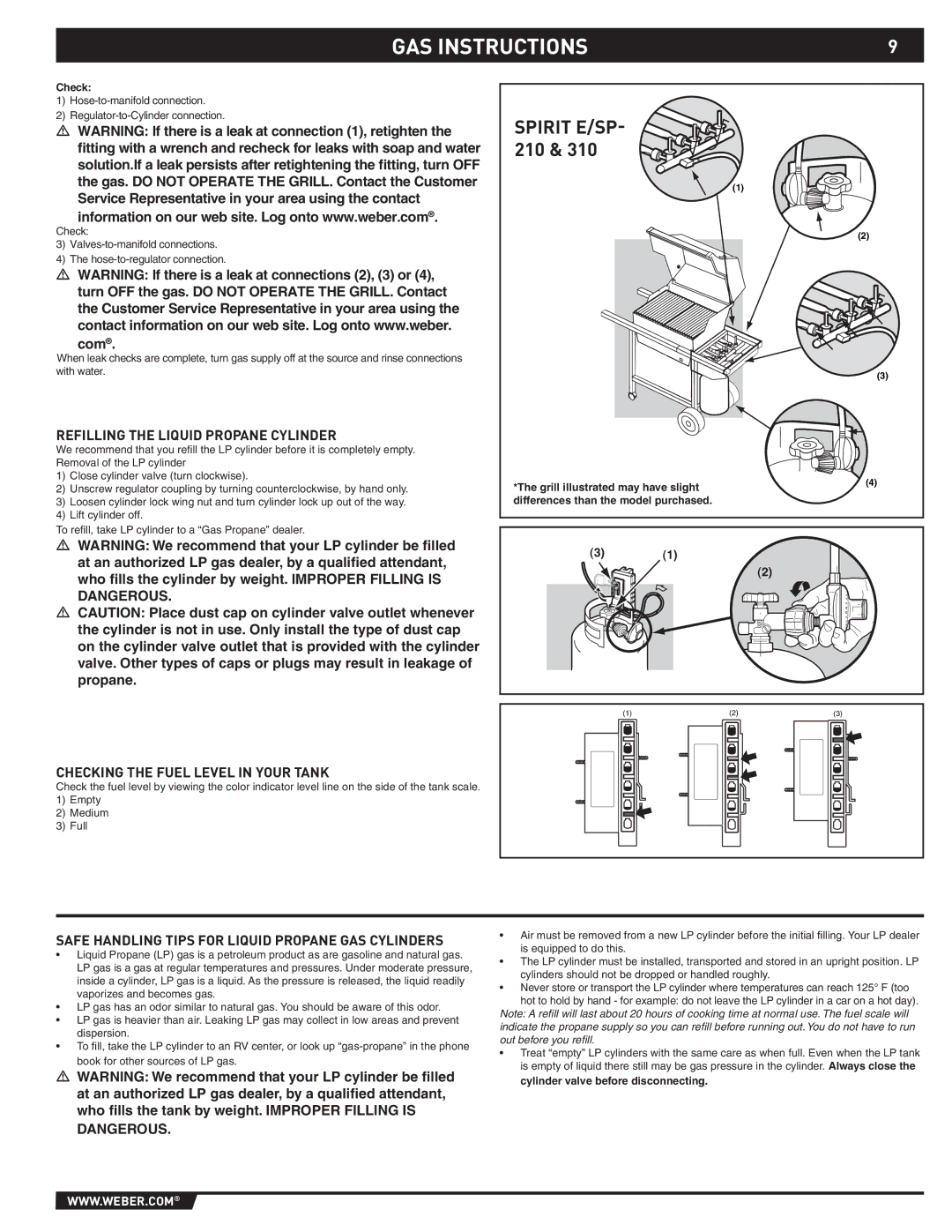
GAS INSTRUCTIONS | 9 |
|
|
Check:
1)
2)
WARNING: If there is a leak at connection (1), retighten the
fitting with a wrench and recheck for leaks with soap and water solution.If a leak persists after retightening the fitting, turn OFF the gas. DO NOT OPERATE THE GRILL. Contact the Customer Service Representative in your area using the contact information on our web site. Log onto www.weber.com®.
Check:
3)
4)The
WARNING: If there is a leak at connections (2), (3) or (4), turn OFF the gas. DO NOT OPERATE THE GRILL. Contact the Customer Service Representative in your area using the contact information on our web site. Log onto www.weber. com®.
When leak checks are complete, turn gas supply off at the source and rinse connections with water.
REFILLING THE LIQUID PROPANE CYLINDER
We recommend that you refi ll the LP cylinder before it is completely empty. Removal of the LP cylinder
1)Close cylinder valve (turn clockwise).
2)Unscrew regulator coupling by turning counterclockwise, by hand only.
3)Loosen cylinder lock wing nut and turn cylinder lock up out of the way.
4)Lift cylinder off.
To refi ll, take LP cylinder to a “Gas Propane” dealer.
WARNING: We recommend that your LP cylinder be filled at an authorized LP gas dealer, by a qualified attendant, who fills the cylinder by weight. IMPROPER FILLING IS DANGEROUS.
CAUTION: Place dust cap on cylinder valve outlet whenever the cylinder is not in use. Only install the type of dust cap on the cylinder valve outlet that is provided with the cylinder valve. Other types of caps or plugs may result in leakage of propane.
CHECKING THE FUEL LEVEL IN YOUR TANK
Check the fuel level by viewing the color indicator level line on the side of the tank scale.
1)Empty
2)Medium
3)Full
SPIRIT E/SP- 210 & 310
(1)
(2)
(3)
*The grill illustrated may have slight | (4) |
| |
differences than the model purchased. |
|
(3) | (1) |
|
|
| (2) |
(1) | (2) | (3) |
SAFE HANDLING TIPS FOR LIQUID PROPANE GAS CYLINDERS
•Liquid Propane (LP) gas is a petroleum product as are gasoline and natural gas. LP gas is a gas at regular temperatures and pressures. Under moderate pressure, inside a cylinder, LP gas is a liquid. As the pressure is released, the liquid readily vaporizes and becomes gas.
•LP gas has an odor similar to natural gas. You should be aware of this odor.
•LP gas is heavier than air. Leaking LP gas may collect in low areas and prevent dispersion.
•To fi ll, take the LP cylinder to an RV center, or look up
WARNING: We recommend that your LP cylinder be filled at an authorized LP gas dealer, by a qualified attendant, who fills the tank by weight. IMPROPER FILLING IS DANGEROUS.
•Air must be removed from a new LP cylinder before the initial filling. Your LP dealer is equipped to do this.
•The LP cylinder must be installed, transported and stored in an upright position. LP cylinders should not be dropped or handled roughly.
•Never store or transport the LP cylinder where temperatures can reach 125° F (too hot to hold by hand - for example: do not leave the LP cylinder in a car on a hot day).
Note: A refill will last about 20 hours of cooking time at normal use. The fuel scale will indicate the propane supply so you can refill before running out. You do not have to run out before you refill.
•Treat “empty” LP cylinders with the same care as when full. Even when the LP tank is empty of liquid there still may be gas pressure in the cylinder. Always close the cylinder valve before disconnecting.
WWW.WEBER.COM®
